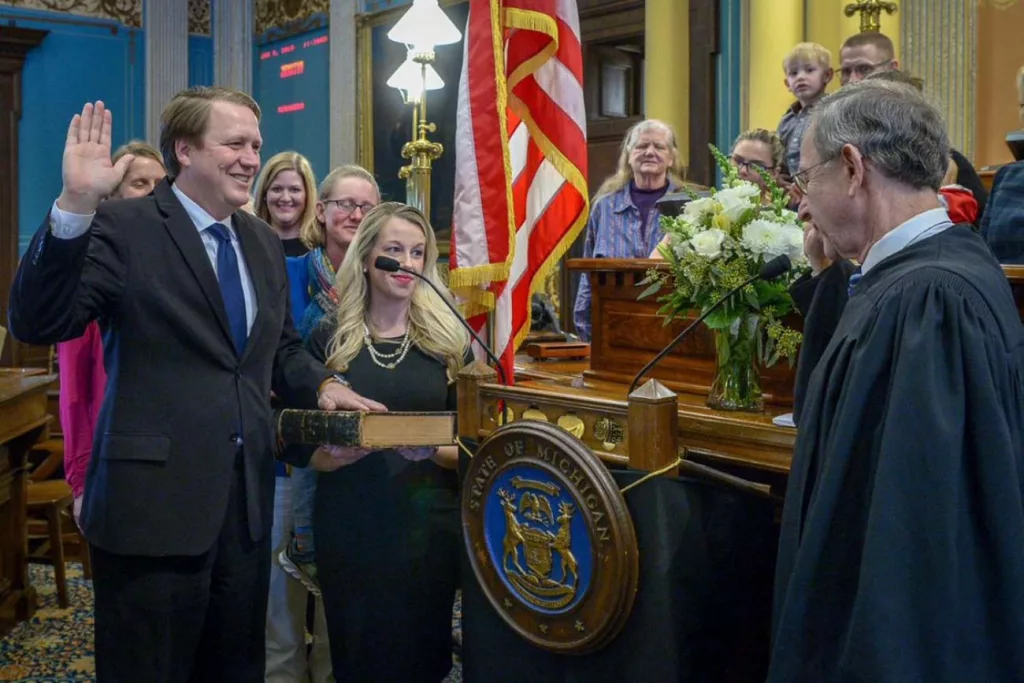The Michigan Legislature will have a new look to it starting next week. Democrats will control both houses for the first time in decades, coupled with their control of the governor’s chair via second term incumbent Governor Gretchen Whitmer. Whether it means new ground that’s fertile for compromise, or a battleground over past disagreements remains to be seen.
However, one thing we know is that there will be new leadership in the Majority and Minority caucuses in both Statehouse chambers. BridgeMichigan, the non-profit, non-partisan newsroom in Lansing is taking an in-depth look at the four lawmakers who are preparing to lead their parties in the Legislature over the next two years. MoodyOnTheMarket.com is presenting these profiles over two days as a service to readers.
SENATE MINORITY LEADER ARIC NESBITT, R- LAWTON
Michigan state Sen. Aric Nesbitt will find himself in a new position next year: the minority.
Nesbitt, R-Lawton, has spent a decade in Lansing as part of Republican majorities in the House and Senate. But now, after Democrats flipped both chambers in last month’s general election, fellow Republicans chose Nesbitt to lead their caucus as the party’s first Senate minority leader in 40 years.
“I’m looking forward to working across the aisle when we can, and when (Democrats) do some far-left-wing partisan activities, fighting to stop that,” Nesbitt told Bridge Michigan. “It’s kind of in their hands.”
Nesbitt, 42, grew up on a sixth-generation farm in southwest Michigan. He now lives down the road from the family’s fruit and dairy operation in Van Buren County, and on social media still describes himself as a “farm boy.”
Nesbitt has been active in politics for decades. After graduating with an economics degree from Hillsdale College, a conservative training ground, Nesbitt worked as a staffer in the state legislature and U.S. Congress.
He ran for the state House in 2010, winning election and serving in the lower chamber for six years. He briefly served as Michigan Lottery commissioner in 2017 before running and winning election to the state Senate in 2018.
Four years later, Nesbitt will lead the smallest Senate GOP caucus in four decades after Democrats capitalized on newly redrawn districts and a strong performance by Gov. Gretchen Whitmer to flip the Senate.
Nesbitt contends that the Democrat’s two-seat majority is far from a mandate to push through the kind of liberal policies they have been unable to advance in prior years.
“They won, but with these razor-thin margins, there’s one clear mandate from the people of Michigan,” Nesbitt told Bridge. “They want the parties to work together to improve education, bolster public safety and foster job growth.”
Nesbitt noted that Senate Republicans outperformed GOP gubernatorial candidate Tudor Dixon. She lost to Democratic Gov. Gretchen Whtimer by more than 468,000 votes, while Senate Republican candidates collectively lost by about 61,000 votes, according to unofficial results reviewed by Bridge.
That’s “because we’ve been working to deliver on those results of balancing budgets, paying down debt, creating jobs,” Nesbitt said of Senate Republicans. “…If I was in the Democrats’ shoes, I would look at trying to govern in a bipartisan way instead of pushing through radical left wing progressive agenda items.”
As a lawmaker in the state House, Nesbitt played a key role in crafting the state’s current energy law, which passed with bipartisan support and was signed in 2016 by Gov. Rick Snyder. In the Senate, he sponsored major auto insurance reforms that passed with bipartisan support and were signed into law by Whitmer.
Now in the minority, Nesbitt said he will continue to look for areas of potential bipartisan compromise, especially in education and public safety. But he’s also preparing to play defense as Democrats formulate plans to repeal or amend major GOP laws.
Democrats have already signaled plans to try and repeal a 2012 Right-to-Work law that struck a major blow to labor unions by prohibiting contracts that require dues or fees as a condition of employment.
Doing so would make Michigan less attractive to companies that are considering where to expand or open up new facilities, Nesbitt argued. Even broaching repeal shows Democrats are “un-serious about their campaigns of economic development and creating jobs,” he said.
Democrats may also revisit a third-grade reading law that requires the state to hold back students whose reading test scores indicate they are more than a full grade-level behind.
Scrapping that law would be “ridiculous,” Nesbitt said, vowing to fight against any legislation that would “lessen accountability” in schools, calling it a “non-starter for Republicans.
Likewise, Nesbitt has already signaled opposition to gun reform legislation that Whitmer wants to sign next year, including safe storage, red-flag confiscation and universal background check proposals.
“I believe in the individual over the state,” Nesbitt said. “Any opportunities where they’re going to limit individual freedom, I”m going to fight against. If there’s going to be ways that they expand individual freedom, I’ll partner with them.”
Photo credit: Michigan Senate Republicans
For solid journalistic coverage of Michigan State Government daily, go to www.BridgeMI.com






